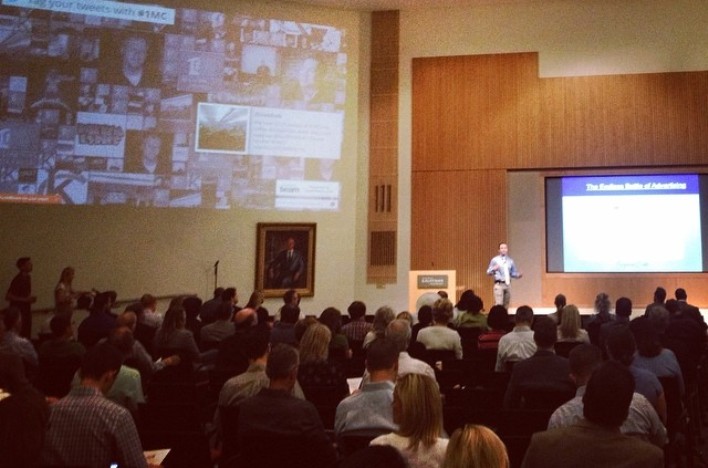If anyone knows how to give a great startup pitch, it’s Nathan Gold, founder of The Demo Coach. When entrepreneurs are picked to present at 1 Million Cups, they’re encouraged to view the how-to videos he made for Kauffman Founders School.
Gold’s best advice for any startup pitch: Tell stories.
“Short, relevant, authentic, honest stories are so effective in getting people to engage with you as a speaker,” he said. “The brain is wired for stories. In my opinion, they’re the No. 1 tool to getting any audience captivated within the first 30 seconds of you standing up there.
“You don’t have to tell people you’re telling them a story. You just say, ‘So three weeks ago, I was standing in my backyard and all of a sudden’—and everybody looks up. They want to know what happened. Stories are good because they help entrepreneurs stand out in a crowded world, where they need a compelling story.”
[ RELATED: HOW 1 MILLION CUPS IMPACTS STARTUPS THAT PRESENT THERE ]
Most entrepreneurs try to be too literal in explaining what they do and it’s “often boring,” Gold said. In contrast, here’s how he describes his own entrepreneurial mission: “Preparing people for high-stakes presentations by rehearsing them as if they were performing in a Broadway show.”
“I can try to explain to you the number of hours and the details that I would put someone through if they had a high-stakes presentation,” Gold said. “But it’s much easier to say, ‘as if they were performing in a Broadway show.’
“One of the most difficult questions asked by entrepreneurs is: ‘How the heck do I communicate in one sentence what we’re doing, when it’s so complex?’ The answer is you can do it in a heartbeat with a simile, an analogy or a metaphor. And the further away you are from technology while doing that, the better it will be. Entrepreneurs feel freedom when they realize: ‘Oh, my gosh, we are like a greenhouse’ or ‘You’re right, we are like a roller coaster’ or ‘We are like the engine of a car—we are!’”
Gold also prepares entrepreneurs for any technical problems during a pitch by telling them that their laptop isn’t working and he’d like them to continue. He’s seen the benefit of such a rehearsal when there’s an actual breakdown during a pitch.
“Usually, what happens is there’s a five-second freak-out moment,” he said. “And then, because they’re prepared, they say, ‘Oh, OK, I can do this.’ And they just give the presentation without the visuals, and it’s usually much better than with the visuals, believe it or not.
“And that’s because they’re forced to use more visual language—they’re forced to use more stories. They can’t just look at a slide and repeat a bullet point. The biggest benefit to telling real stories is you don’t have to rehearse as much, because you already know the story.”
Image courtesy of the Kauffman Foundation.


